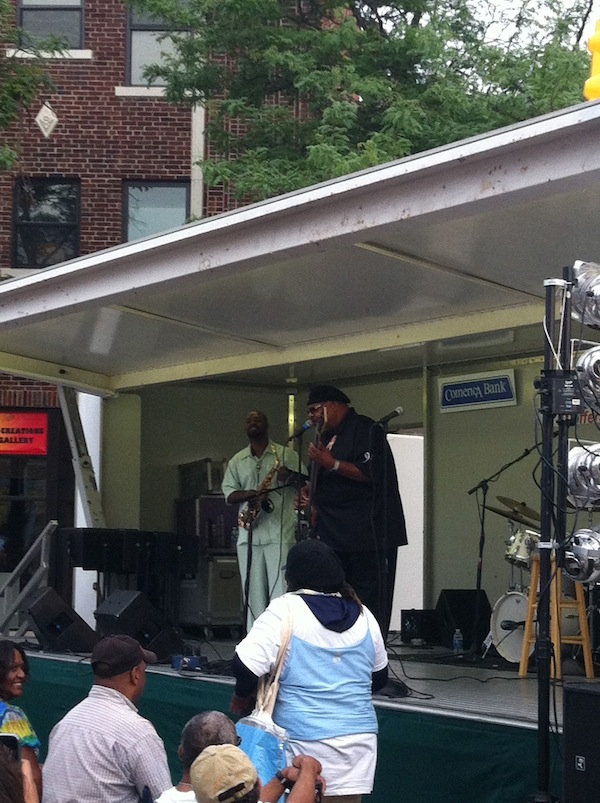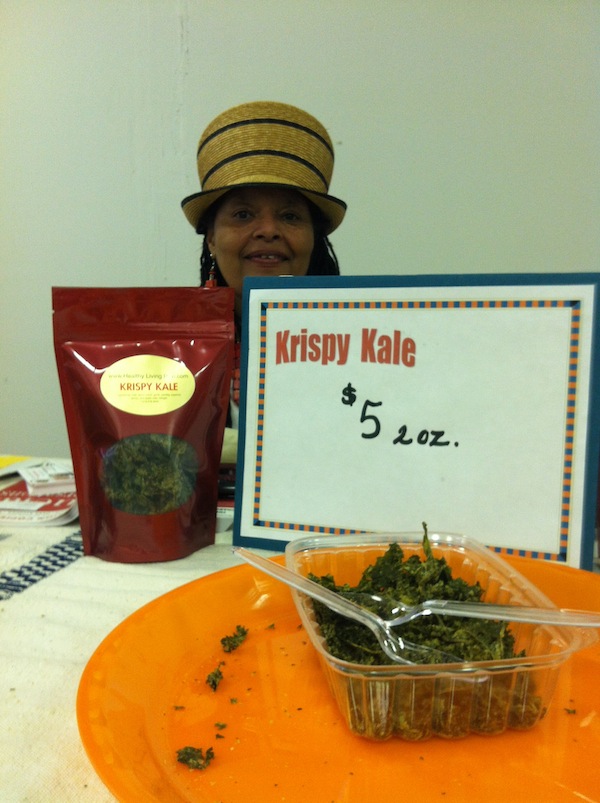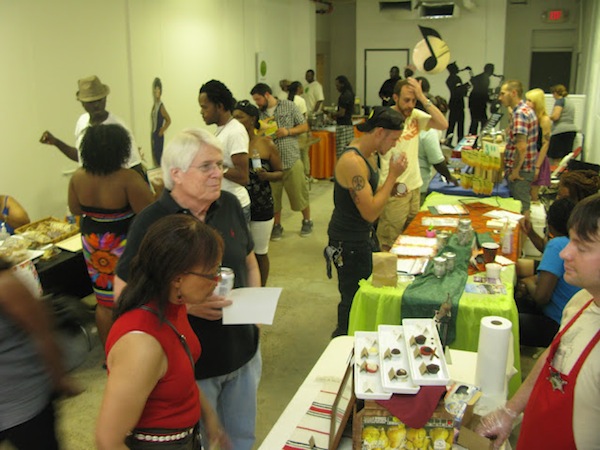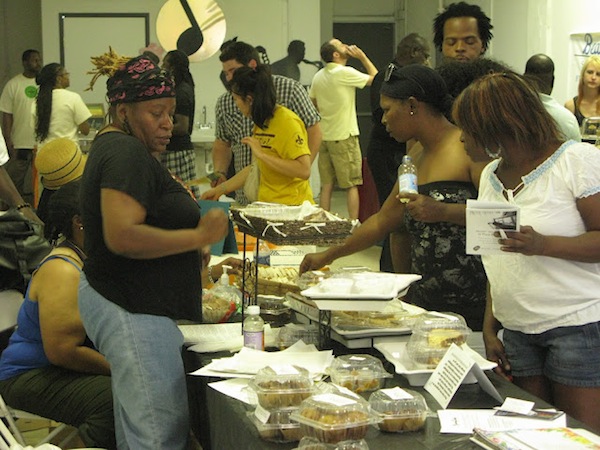
Jazzin’ on Jefferson brings the community together
Summertime and jazz go hand in hand here in Detroit, and this past weekend was no exception. Now in its ninth year, Jazzin’ on Jefferson — sponsored by the Jefferson East Business Assocation (JEBA) — once again brought the community together for two days of jazz performances by artists from Detroit and beyond, along with a host of businesses and artisans who established pop-up retail spaces in the vacant storefronts at Jefferson and Chalmers in Detroit’s lower east side.
One of the pop-up businesses new to the scene this year was FoodLab, which provided retail space to a unique mix of local entrepreneurs delivering healthy, carefully-prepared culinary offerings. I had the pleasure of personally sampling and enjoying the food from many of the vendors in FoodLab’s pop-up space. It was a refreshing surprise to be able to snack on healthy foods — such as crispy dehydrated kale by Healthy Living Raw — as opposed to the more conventional fried fare typically found at festivals.
FoodLab’s pop-up retail space.
Tabia Coulibaly, the entrepreneur behind Healthy Living Raw.
FoodLab, which is only in its second year of operation, serves as an invaluable resource to numerous small-scale entrepreneurs — many of whom lack retail space, investor backing and access to critical social networks — providing support to help make their culinary business dreams come true. I had the pleasure of catching up with Jess Daniel, the director of FoodLab, to ask her a few questions about the organization. An excerpt from our conversation is below:
Jeremy Schmall: Could you give me a little background on FoodLab? Jess Daniel: We started very organically, and we’re not very good at talking about ourselves in a succinct way quite yet, but usually I describe us as a community of entrepreneurs who are working together and with key partners to build a thriving ecosystem of diverse, locally-owned, fair and ecologically conscious good food businesses. We focus on post-farmgate businesses (processing, distribution, retail) since there are already great organizations focusing on growers. We are both about growing strong individual businesses and about paying attention to opportunities to engage in collective action towards common goals, such as changing policy to support locally owned food enterprise, developing cooperative services like commercial kitchen space, shared accountants, labor through time-banking and much more.
Our values drive what we do. Something from the original charter: “We are fueled by the belief that diverse, locally owned and operated food businesses are key to vibrant, resilient, healthy places; that food businesses can and should seek to create social value beyond financial profit (e.g. by providing increased access to healthy food, creating sustainable livelihoods or supporting local and sustainable producers); and that food businesses have the opportunity to help address a broad array of environmental and social issues (such as equity, public health and community economic development) in the city of Detroit and in our region.”
Right now, we do these things by sharing information, resources and emotional support, engaging in practical dialogue about the role and responsibility of good food businesses in Detroit, and organizing culturally relevant technical assistance that is grounded in values like sustainability and social equity.
A lot of what I do as the FoodLab coordinator is network weaving or brokering relationships. There’s a huge universe of stuff out there, which can be difficult to wade through, and many entrepreneurs simply don’t have access to certain networks that they might need to be successful. I see my job as a mix of social worker, matchmaker and organizer.
A view from inside FoodLab’s pop-up retail space. Image courtesy FoodLab
JS: What does the term triple-bottom-line refer to? JD: In “traditional” business, day-to-day decisions (and sometimes even legal obligations) are driven by a single bottom line: profit. In a triple-bottom-line business we pay attention to the social and environmental value we’re creating, as well as the financial viability. In this way of looking at the world, business doesn’t exist just to create profit, but to contribute to the well-being of our communities and our physical environment.
Another view of vendors and customers inside FoodLab’s pop-up retail space. Image courtesy of FoodLab
JS: How has the community responded to FoodLab? JD: We operate almost entirely on a volunteer basis, with a very small budget for activities and some support for me and program assistants from Detroiters Working for Environmental Justice (they are the bomb!). We intentionally haven’t done much outreach or advertising about who we are (we don’t even have a functioning website yet) besides some very intentional recruiting to make sure we’re reaching entrepreneurs outside of the typical youngish, white, college-educated “hipster” foodie crowd. And yet people seem to be talking about what we’re doing and reaching out to us to try to partner with us, join the organization and serve as volunteers. For example, the EAT Ag Apprentice Training Program at Earthworks has asked if we can help support some training for their entrepreneurs. The Detroit Food Policy Council asked us to do a workshop at their recent summit. I’ve been asked to talk at a fancy environmental grantmakers conference in the Hudson Valley, NY in the Fall about our approach to network building.
In terms of folks who are participating, what I’ve heard again and again is that our approach and values resonate with people who don’t necessarily feel like they fit into traditional business development culture, which tends to operate in a pretty industrial, linear, growth-centered paradigm. People who have participated in our workshops or come to meetings are drawn in because they like a more natural approach to business development, they like that we pay attention to whole people and not just people as entrepreneurs (people who have values, families, histories, cultures), they like that values such as sustainability and justice are incorporated from the very beginning.
JS: How did the partnership with Jefferson East Business Association (JEBA) come about? JD: I’m friends with Ritchie Harrison at JEBA, so he knew a little bit about the work I was doing. When it came time to organize Jazzin’ on Jefferson, they had an idea to activate retail spaces with local businesses to 1) show support, and 2) help investors and community members envision what that strip could look like if it were filled. Ritchie thought FoodLab would be a good fit.
JS: What’s in store for the future of FoodLab? JD: Ah, so much. We’re still young and small and figuring out how to sustain and grow our activities over time. Over the summer, we’re continuing our regular meetings and a few projects — organizing a network of folks starting shared use kitchen space, working to connect local growers with food businesses, and more — but focusing a lot on organizational design with the Green Garage (who’s also graciously sponsored us with office space for six months). We’re making a transition from a very organic start to developing more organizational structure and systems. Right now, the main energy is volunteers, plus my time — about 40-50 hours/week, financed on a graduate assistant salary and tangentially-related consulting projects — and that’s not sustainable over the long term. We’ll be looking for a planning grant to help us figure some of this stuff out in the next few months.
For more information, or if you would like to join the FoodLab listserv, you can apply here. More information on FoodLab here, courtesy of UIX. An interview with Jess Daniel on WDET can be found here.
Recent Content
-
Artsarticle ·
-
Artsarticle ·
-
Artsarticle ·





